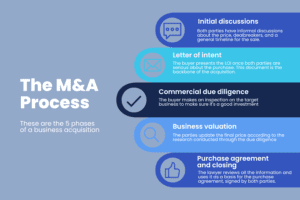Congratulations, you signed a letter of intent (LOI) to buy a business, but now you don’t know what to do next. Or maybe you’re about to sign an LOI, but want to go with eyes wide open and know the next steps. So what are the steps of the M&A process?
The process of buying a business is simple, but not easy. The Mergers and Acquisitions process can be broken down into 5 main steps:
- Initial discussions
- Letter of Intent
- Due diligence
- Business valuation
- Purchase agreement and closing

These are the five phases of the acquisition process
Initial discussions
The first step of purchasing a business is when buyers and sellers in a purchase sale have informal discussions about whether it makes sense for the buyer to buy the seller’s business. At the very least, the seller should have the buyer sign a non-disclosure agreement (NDA) since the seller is probably handing over some sensitive financial and market information. The seller may provide tax returns, profit and loss reports, and daily or weekly sales reports. The parties also often discuss price, deal breakers, and a general timeline for the sale.
In order for the deal to move forward in the steps M&A process, the buyer and seller need to have important discussions about the most important terms. This is when the Letter of Intent comes into place.
Letter of Intent
Once the purchaser and the seller have a serious negotiation, the buyer will present a letter of intent (LOI), which is a non-binding document that states the purchase price and the basic terms of the acquisition. Such terms include the timeline for due diligence, confidentiality, and determine whether the transaction is a stock sale versus an asset sale.
Although LOIs are intended to be non-binding, they should be carefully written to make sure that they are not enforceable. If it’s not written properly, it could act as a contract. Also, as a practical matter, just because the LOI is non-binding regarding whether the sale will proceed, it should still be taken seriously. Among the considerations of LOIs is that the terms of the Letter of Intent typically make their way into the final purchase agreement and are the backbone of the negotiation.
The terms that should be included in the LOI for a business purchase typically are:
- Purchase price
- Whether the sale will be an asset sale or a stock sale
- No-shop clause, which prohibits the seller from accepting other offers
- Terms the buyer insists on in order to move the deal forward. A common example is a buyer often requires the seller’s key people to remain in the company to help the transition.
- Deal-breakers
- Buyer’s right to access seller’s documents and financials
- Confidentiality clause
- Non-binding clause, to remove any doubt that the LOI is non-binding
- Timeline or expiration date for the LOI
Asset sale or stock sale?
The parties should also consider whether to move forward with an asset sale or stock sale. Generally, sellers like to sell stock (meaning, the whole company) and buyers like to buy assets (just the assets of the business). Why is that? Because if a seller sells the entire company, the buyer also takes on the existing liability —which is ideal for the seller. And liability is precisely one reason why buyers do not want to buy the full company. Also, it is more tax advantageous for a buyer to buy the assets instead of stock because the buyer can claim the depreciation.
That said, choosing an asset or stock sale depends ultimately on the specific businesses and needs of each side. For example, a buyer may want to buy the stock instead of the assets of the seller’s business model depends on referrals and business relationships. These relationships do not automatically transfer in an asset sale. On the flip side, a seller may prefer an asset sale because the seller does not want to sell the whole company or an asset sale may be more simple if it is a smaller sale.
It is better to consult with both your attorney and accountant to determine which is best.
Biggest Mistakes When Writing a LOI Business Proposal
By the time people come to me when purchasing a business, they have (unfortunately) already signed the LOI. What are the biggest mistakes we’ve seen?
- Incorrectly choosing asset sale when it should be a stock sale and vice versa
- Not deciding if it should be an asset or stock sale at all
- Not including a price
- Not including a no-shop clause (if buyer)
- The buyer signing the LOI in his or personal name instead of a business name
Usually these issues can be fixed, but it often sours the deals and annoys the seller.
Commercial Due Diligence
Ok, whew — that’s a lot of steps of purchasing a business, and we’re still in the initial phases. So what’s next? Due diligence! This is when the buyer gets to really learn if the business is a good investment. Due diligence is also important to protect the buyer in case the seller lies to the buyer. A court is less like to sympathize with a buyer who is defrauded if the buyer did not do an investigation.
So what are some things a buyer looks for in due diligence?
Due Diligence Checklist
- Business owner authorization of the sale
- Contracts that affect the sale
- Contracts that are important to the business function
- Lease/real estate agreements
- License statuses
- Environmental compliance
- Financial health and history
- Liens
- Unpaid taxes
- Potential lawsuits
Skipping due diligence can be costly, even for “small deals.” We see this happen a lot in our practice when people come to our office trying to undo a business deal or trying to fix their purchase because of skipping due diligence. This is especially common with smaller deals because they thought it was not necessary or worth it to hire a lawyer.
One time, a buyer was about to spend $30,000 on a buying a business without doing due diligence and did not consider that the seller’s business needed approval from another company. Even though that deal was “small,” the buyer would have still wasted tens of thousands of dollars, not to mention the time he would have invested in a business he does not legally own.
Another buyer bought a business but did not check whether the seller’s business’s licenses were active. Soon he was getting letters from the city that his business was in violation and was being fined thousands of dollars. The seller moved out of the country by then so it was hard to recover anything from the seller.
Moral of the story: do not skip due diligence.
Business Valuation
The parties often discuss a purchase price when signing the LOI, but the price is contingent on due diligence. Of course, if the buyer finds a lot of problems with the business, the buyer can change the purchase price.
With more sophisticated sellers, they may already have a business valuation done when putting the business up for sale. When buying a business, you may run into the term “EBITDA” which stands for earnings before interest, taxes, depreciation, and amortization. This is one way to calculate how much a business is worth. Otherwise, the main ways to calculate a business are the cost approach, the income approach, the market approach, and the cost approach.
A buyer typically will have their own valuer review the seller’s valuation, and does not necessarily do a complete valuation on their own.
With that said, at the end of the day, buyers and sellers have their own personal goals and circumstances that dictate how much they are willing to buy or sell a business for.
Purchase agreement and closing
Once due diligence is over, we go to the next step of purchasing a business. This is when the attorney (typically the buyer’s attorney) draws up the purchase agreement. The closing documents will either be an asset purchase agreement or a stock purchase agreement. The attorney will review the information received from due diligence and write the warranties, representations, waivers, disclaimers, and other terms the parties need.
An example of using due diligence for the purchase agreement is if, for example, the buyer was buying a business that has a lot of equipment that required regular maintenance. The seller can put in the representations section that the seller has been properly maintained the equipment. It is very important to be clear about these terms, especially when it comes to warranties and representations. With that said, the buyer should still do their own due diligence about maintenance. But having clear warranties and representations gives the buyer more leverage if the seller did not actually maintain the equipment in this case.
Another important, but underrated, tool in purchase agreements is a holdback clause. When doing due diligence, certain unknowns or liabilities may appear. Here, the buyer can negotiate a holdback clause where a certain percentage of the purchase funds are put in an escrow account for a period of time to see how the business plays out. The purchase agreement can include triggers for when the buyer can recover the escrow funds or, after a time, the seller can have the escrow funds back.
Lastly, the parties will choose a closing date and exchange necessary documents and money and the deal is done.
Need help buying a business? Call today at (630) 517-5529 to receive personalized attention from our M&A advisors.



